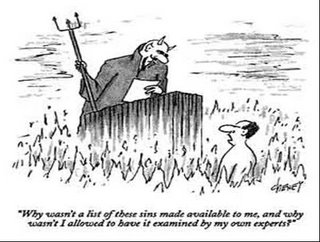Christian Humanism IV: Morality
Wednesday, December 13, 2006
Sin As A Failure to Bother to Love
Scripture
Pharisee & the Tax Collector
Lazarus and the Rich Man
The Good Samaritan
The Prodigal Son
Sinning Out of Our Strengths
Being Surprised by Our Sins
An Attitude of Humility
Pharisee & the Tax Collector
Lazarus and the Rich Man
The Good Samaritan
The Prodigal Son
Sinning Out of Our Strengths
Being Surprised by Our Sins
An Attitude of Humility
Sin

In the previous posts, we have discussed what conscience is. And we may conclude it with a definition of conscience: conscience as a search for the loving thing to do.
We begin with this post on sin by defining sin as a failure to bother to love. If we use our conscience, or we search for the loving thing, and we choose not to do it, we sin. We fail to bother to love.
Notions of Sin & Humanity
This definition points to us that the grammar school notion that sin is a crime is inaccurate. If sin were merely a crime it addresses more of the superego rather than our conscience. Moreover, viewing sin as a crime focuses more on the fear of being caught and the corresponding punishment.
 The ultimate punishment then of someone sinful is to be sent to hell.
The ultimate punishment then of someone sinful is to be sent to hell.
4th to 2oth Century
St. Augustine, St. Thomas Aquinas, and many others subscribe to the view of humanity as very sinful. We are liable to sin and thus, many are damned to eternal punishment and only a select few will go to heaven. This is known as massa damnata or mass damnation.
This view of sin and humanity is unhealthy because it creates a vindictive image of God: one who is interested more in punishment. This view underestimates God's mercy.
1970s to Present
After Vatican II, many believers swung to the opposite extreme known as massa bonna. People who subscribe to this belief think of humanity as purely good since man is created in the image and likeness of God. Man is thus seen as deserving to go to heaven since man's sinfulness is downplayed.
This too is unhealthy because it fails to acknowledge the presence of evil in the world, and makes humanity too complacent about its own faults.
We are sinners but loved.
The more balanced way of looking at humanity and sin is to acknowledge one's sinfulness and at the same time acknowledge God's loving mercy: to know that we are sinners but loved.
In fact when we see the words referring to sin such as adikia (wrongdoing), hubris (pride), or hamartia (missing the mark), we also find a partner word. That word is metanoia or a change of heart.
This only shows us that in our faith, sin does not have the final word, but it is the mercy of God that has the final word. That sin should always be viewed as an invitation to conversion.

In the previous posts, we have discussed what conscience is. And we may conclude it with a definition of conscience: conscience as a search for the loving thing to do.
We begin with this post on sin by defining sin as a failure to bother to love. If we use our conscience, or we search for the loving thing, and we choose not to do it, we sin. We fail to bother to love.
Notions of Sin & Humanity
This definition points to us that the grammar school notion that sin is a crime is inaccurate. If sin were merely a crime it addresses more of the superego rather than our conscience. Moreover, viewing sin as a crime focuses more on the fear of being caught and the corresponding punishment.
 The ultimate punishment then of someone sinful is to be sent to hell.
The ultimate punishment then of someone sinful is to be sent to hell.4th to 2oth Century
St. Augustine, St. Thomas Aquinas, and many others subscribe to the view of humanity as very sinful. We are liable to sin and thus, many are damned to eternal punishment and only a select few will go to heaven. This is known as massa damnata or mass damnation.
This view of sin and humanity is unhealthy because it creates a vindictive image of God: one who is interested more in punishment. This view underestimates God's mercy.
1970s to Present
After Vatican II, many believers swung to the opposite extreme known as massa bonna. People who subscribe to this belief think of humanity as purely good since man is created in the image and likeness of God. Man is thus seen as deserving to go to heaven since man's sinfulness is downplayed.
This too is unhealthy because it fails to acknowledge the presence of evil in the world, and makes humanity too complacent about its own faults.
We are sinners but loved.
The more balanced way of looking at humanity and sin is to acknowledge one's sinfulness and at the same time acknowledge God's loving mercy: to know that we are sinners but loved.
In fact when we see the words referring to sin such as adikia (wrongdoing), hubris (pride), or hamartia (missing the mark), we also find a partner word. That word is metanoia or a change of heart.
This only shows us that in our faith, sin does not have the final word, but it is the mercy of God that has the final word. That sin should always be viewed as an invitation to conversion.
